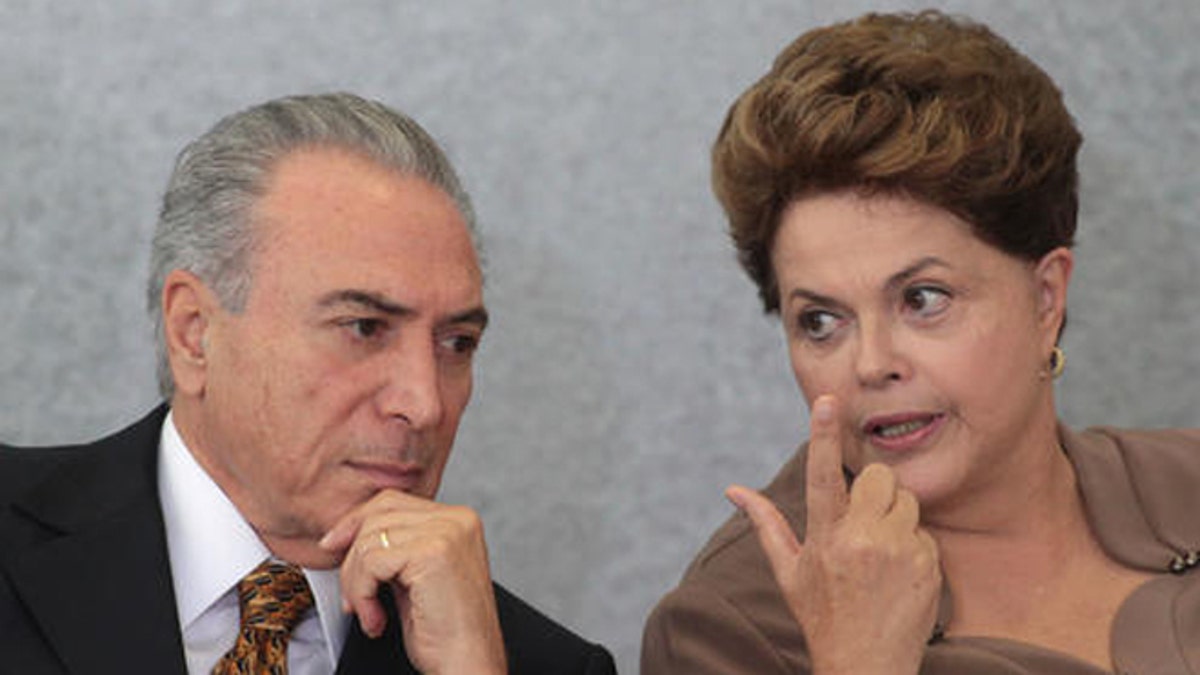
FILE - In this April 24, 2012 file photo, Brazil's President Dilma Rousseff, right, talks with Vice President Michel Temer, during a ceremony at Planalto Palace in Brasilia, Brazil. Three ministers in the government of interim President Temer, who took over when Rousseff was suspended in May, were forced to resign right after taking office because of corruption allegations. And Temer himself has been fingered for bribery by witnesses in the Petrobras investigation who have reached plea deals with prosecutors, though so far he has not been charged. (AP Photo/Eraldo Peres) (Copyright 2016 The Associated Press. All rights reserved. This material may not be published, broadcast, rewritten or redistribu)
BRASILIA, Brazil (AP) – Michel Temer has been sworn in as Brazil's new leader following the ouster of President Dilma Rousseff.
Temer took an oath of office a few hours after the Senate voted 61-20 to remove Rousseff from office for breaking fiscal laws in her management of the federal budget.
Temer was accompanied by leaders of both chambers of Congress and his Cabinet. He did not make any statements, and expected to address the nation later Wednesday.
The 75-year-old career politician had been acting president since May, when the Senate impeached and suspended Rousseff ahead of the trial to decide her fate.
Brazil's Senate on Wednesday voted to remove President Dilma Rousseff from office, the culmination of a yearlong fight that paralyzed Latin America's largest nation and exposed deep rifts among its people on everything from race relations to social spending.
While Rousseff's ouster was widely expected, the decision was a key chapter in a colossal political struggle that is far from over. Rousseff was Brazil's first female president, with a storied career that includes a time as a Marxist guerrilla jailed and tortured in the 1970s during the country's dictatorship.
"The Senate has found that the president of the federal republic of Brazil, Dilma Vana Rousseff, committed crimes in breaking fiscal laws," said Chief Justice Ricardo Lewandowski, who presided over the trial.
Opposition lawmakers, who made clear early on the only solution was getting her out of office, argued that the maneuvers masked yawning deficits from high spending and ultimately exacerbated the recession in a nation that had long enjoyed darling status among emerging economies.
Nonsense, Rousseff countered time and again, proclaiming her innocence up to the end. Previous presidents used similar accounting techniques, she noted, saying the push to remove her was a bloodless coup d'etat by elites fuming over the populist polices of her Workers' Party the last 13 years.
The opposition needed 54 of the 81 senators to vote in favor for her to be removed. They got many more, winning in a landslide of sorts, 61-20.
"Today is the day that 61 men, many of them charged and corrupt, threw 54 million Brazilian votes in the garbage," Rousseff tweeted minutes after the decision.
Rousseff won re-election in 2014, garnering more than 54 million votes.
In a second Senate vote about 30 minutes later, Rousseff won a minor victory as a measure to ban her from public office for eight years failed. The 42-36 vote fell short of the 54 votes needed for passage.
In the background of the entire fight was a wide-ranging investigation into billions of dollars in kickbacks at state oil company Petrobras. The two-year probe has led to the jailing of dozens of top businessmen and politicians from across the political spectrum, and threatens many of the same lawmakers who voted to remove Rousseff.
Rousseff argued that many opponents just wanted her out of the way so they could save their own skins by tampering with the investigation, which Rousseff had refused to do.
Many lawmakers and Brazilians nationwide, meanwhile, blamed Rousseff for the graft even though she has never been personally implicated. They argued that she had to know, as many of the alleged bribes happened while her party was in power.
